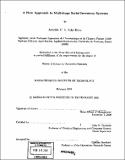| dc.contributor.advisor | John N. Tsitsiklis. | en_US |
| dc.contributor.author | Achy-Brou, Aristide C. E., 1976- | en_US |
| dc.contributor.other | Massachusetts Institute of Technology. Operations Research Center. | en_US |
| dc.date.accessioned | 2005-08-23T15:14:21Z | |
| dc.date.available | 2005-08-23T15:14:21Z | |
| dc.date.copyright | 2001 | en_US |
| dc.date.issued | 2001 | en_US |
| dc.identifier.uri | http://hdl.handle.net/1721.1/8776 | |
| dc.description | Thesis (S.M.)--Massachusetts Institute of Technology, Sloan School of Management, Operations Research Center, 2001. | en_US |
| dc.description | Includes bibliographical references (leaves 61-62). | en_US |
| dc.description.abstract | We consider a single product multistage serial inventory system with several installations, say N - I, ... , l. Installation N - I intakes exogenous supply of a single commodity. For i E {I, ... N - 2}, installation i is supplied by shipments from installation i + 1. Demands for the finished good occur at installation l. Demands that cannot be filled immediately are backlogged. We assume holding costs at each installation which are linear functions of inventory, as well as a constant cost for each unit of backlogged demand, per period. Clark and Scarf {1960) showed that over a finite horizon an echelon basestock policy is optimal. Federgruen and Zipkin (1984) extend their result to the infinite-horizon case for both discounted and average costs. We present a new approach to this multistage serial inventory management problem, and give new proofs of these results by introducing and solving a simple Travel Time problem, using Dynamic Programming. This approach is motivated by the fact that the exact cost-to-go function of the related Travel Time problem can be easily computed using a straightforward recursive procedure (instead of using the typical value iteration or policy iteration methods). Moreover, this cost-to-go function gives various insights useful for a group of more complex multistage inventory problems. In this regard, we discuss how this cost-to-go function can be used to develop good Approximate Dynamic Programming algorithms for a number of complex multistage serial inventory problems. The results obtained suggest that the idea of introducing a related "Travel Time" problem and our algorithm to solve this problem can be used as a building block of a new approach to solve large scale multistage inventory management problems. This thesis was part of a research effort to find a fast algorithm to get very good robust suboptimal solutions to large scale multistage inventory management problems. | en_US |
| dc.description.statementofresponsibility | by Aristide C.E. Achy-Brou. | en_US |
| dc.format.extent | 62 leaves | en_US |
| dc.format.extent | 3404163 bytes | |
| dc.format.extent | 3403919 bytes | |
| dc.format.mimetype | application/pdf | |
| dc.format.mimetype | application/pdf | |
| dc.language.iso | eng | en_US |
| dc.publisher | Massachusetts Institute of Technology | en_US |
| dc.rights | M.I.T. theses are protected by copyright. They may be viewed from this source for any purpose, but reproduction or distribution in any format is prohibited without written permission. See provided URL for inquiries about permission. | en_US |
| dc.rights.uri | http://dspace.mit.edu/handle/1721.1/7582 | |
| dc.subject | Operations Research Center. | en_US |
| dc.title | A new approach to multistage serial inventory systems | en_US |
| dc.type | Thesis | en_US |
| dc.description.degree | S.M. | en_US |
| dc.contributor.department | Massachusetts Institute of Technology. Operations Research Center | |
| dc.contributor.department | Sloan School of Management | |
| dc.identifier.oclc | 48155059 | en_US |
